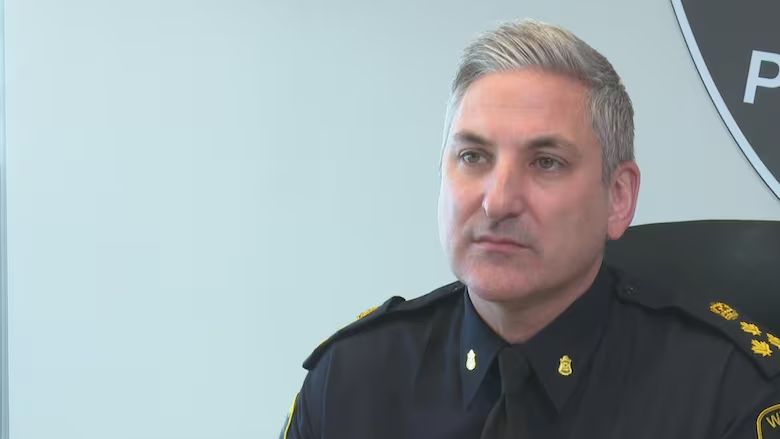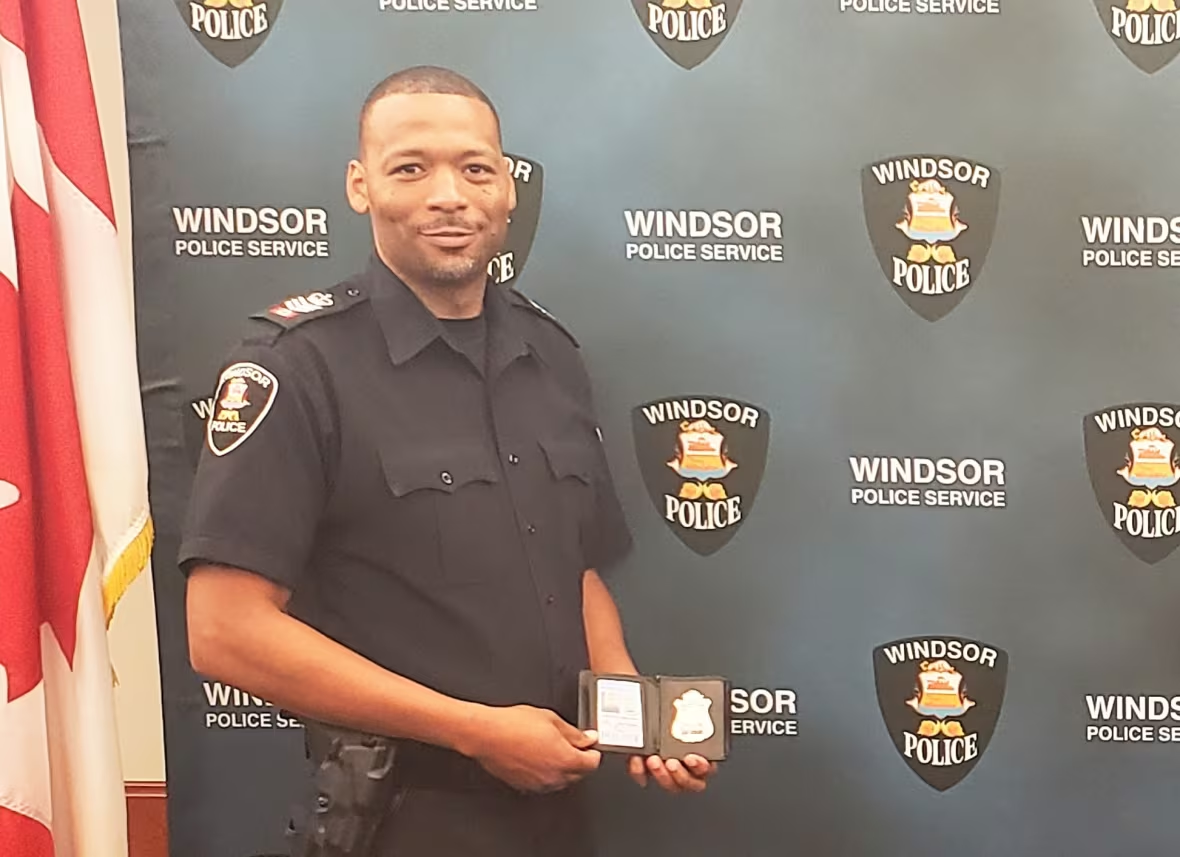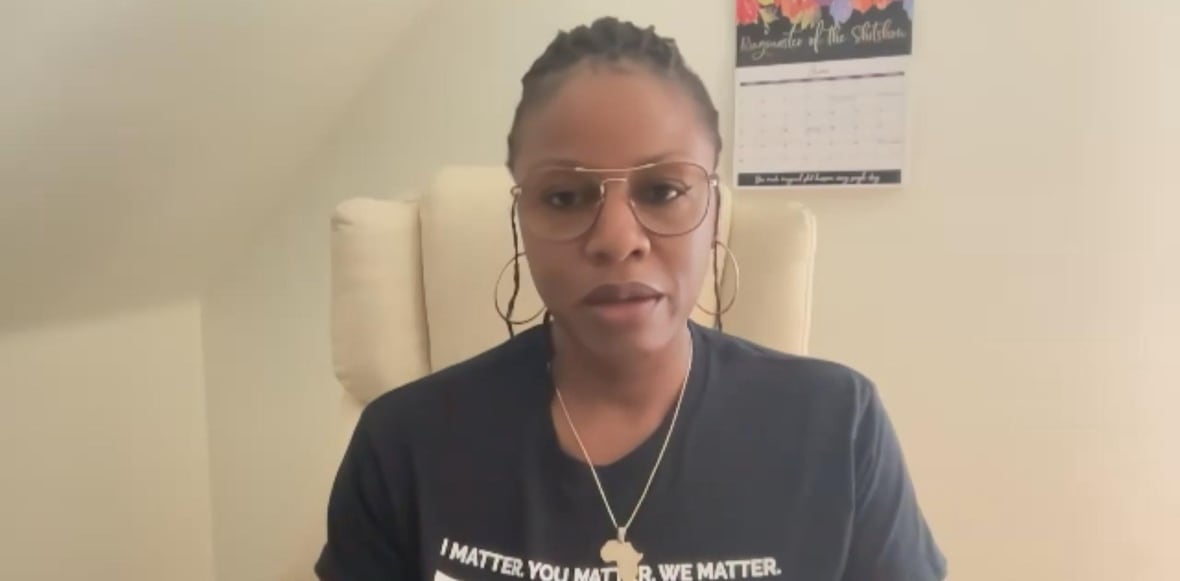High-ranking Black officer's rights complaint alleges Windsor police chief made racially derogatory remarks
Police service won't comment as the case is before Human Rights Tribunal of Ontario

WARNING: This story contains racially offensive language.
Windsor's first Black police inspector has filed an Ontario human rights complaint, saying he heard the city's chief made derogatory and offensive comments toward the Black community.
Ed Armstrong registered the complaint to the Human Rights Tribunal of Ontario (HRTO) in March, saying Jason Bellaire made comments to him about Black people and bananas, told him he preferred "whiter" things and suggested there is telepathic communication among Black people, CBC News has learned.

According to the allegations, which haven't been proven before the tribunal, the instances took place between March 2023 and February 2024.
Armstrong became Windsor's first Black staff sergeant in 2020 and the first Black inspector in 2021, elevating him to the police service's senior leadership team.
In his complaint obtained from the HRTO, Armstrong alleges Bellaire asked him to use his "Black magic" on Natalie Deckard, head of the interdisciplinary and critical studies at the University of Windsor, to ease her criticism of Windsor police.
Bellaire also referred to Deckard as a "Black radical" in a conversation with Armstrong, the complaint said.
I find allegations like these deeply troubling. I certainly don't find them surprising in some sense.- Julius Haag, University of Toronto Mississauga sociology department
In a separate instance, Armstrong said, Bellaire mentioned needing a "Black friend" to accompany him to certain events.
CBC News reached out to Armstrong and did not receive a response.
Windsor police service declines comment
The Windsor Police Service also was contacted, but wouldn't discuss the case.
"As this complaint is currently before the Human Rights Tribunal, we respectfully decline to comment on this matter," said Gary Francoeur, director of corporate communications.
The complaint was filed on March 15, roughly a month after Armstrong pleaded guilty under the Police Services Act for making inappropriate comments to female employees dating back to 2005. Armstrong was demoted for one year to staff sergeant and will automatically regain his rank of inspector after that time.
Armstrong said in the HRTO application that prior to that, he hadn't received any complaints against him in his 25-year career.
Armstrong's complaint says the inequitable treatment continued when Bellaire relocated him to work in direct contact with the people who say they were offended by his remarks, causing him to question the legitimacy of the investigation into his conduct.
It resulted in him seeking "professional help to cope with the emotional toll," the complaint says.
Police union wants truth to be uncovered
The Windsor Police Association said it's supporting Armstrong through the process.

As for the timing, president Kent Rice said officers come forward at different times for a variety of reasons.
"Officers fear retaliation or harm to their careers, especially if they are striving to advance within the organization. Speaking out may jeopardize their position or hinder their advancement," Rice said in a statement to CBC News.
Rice said the allegations in the HRTO complaint are serious, but wouldn't comment further until a "thorough examination" is complete "as we seek to uncovering the truth."
Camisha Sibblis, director of the Black Scholars Institute at the University of Windsor, said the claims, if true, have far-reaching consequences.
Trust between Black communities and police is especially important, she said.

"The chief sets the climate for the police in the region and to know that these are the racist currents ... under which these police officers are working, it undermines a lot of that trust."
'It's still very hurtful': Black Council of Windsor-Essex
The founding chair of the Black Council of Windsor-Essex said the complaint details make her wonder how senior Windsor police leaders perceive the Black community.
"If you're going to joke about one of your fellow police officers liking bananas, or whatever it was, then how are you looking at the Black community as a whole?" said Leslie McCurdy.

McCurdy said she was "hopeful" when Bellaire became permanent chief in November 2022.
"The alleged casualness with which such derogatory references are made and the joking manner they are made — a lot of times people think you can laugh stuff off and it's a joke, but it's still very hurtful."
Deckard, who's mentioned in the complaint, said, "I am so tired of learning things like this. It's just absurd."
Armstrong's complaint also named a superintendent he says made "racially inappropriate comments about members of the Indigenous community." The claim doesn't specify what those comments were.
Armstrong claims that after viewing a Black history video made by the police service, he overheard members of the senior leadership team saying some new recruits who appeared in the video aren't "Black enough." Armstrong doesn't name these individuals.
Julius Haag, an assistant professor in the sociology department at the University of Toronto Mississauga, said that if the allegations are true, they're "deeply troubling."
"I certainly don't find them to be surprising in some sense."
Haag's research primarily focuses on policing and how officers interact with people, particularly racialized and Black communities.

Allegations against senior leadership pose unique challenges, Haag said.
"These are the individuals that we're looking for to steer the police service in the right direction, to serve as examples and role models for other officers, to set the tenor of what should be happening within the police service. Leaders in police play a strong role in determining and shaping that culture and what's expected of their officers."
Armstrong is seeking $2 million for lost wages and emotional distress, among other reasons, his complaint said.
He also wants an external equity audit review of internal policies, including the possible disciplinary action of employees.

Mayor Drew Dilkens, who chairs the Windsor Police Services Board, said it "is aware of this complaint and is taking action to investigate and respond to the matter before the Human Rights Tribunal of Ontario in accordance with all statutory timelines.
"As the matter is currently before the tribunal, the board will make no further comment at this time."
John Elliott became the board's only non-white member when he was appointed by the province in June 2023. He also didn't comment.
Service wants complaint dealt with internally
The police service has asked that the human rights complaint be dismissed so it could be dealt with internally, the HRTO documents show.
They show Armstrong filed an internal complaint with the police service on March 22, seven days after filing similar allegations with the HRTO.
As a publicly funded organization, the police service said in its submissions that "it should not be required to expand its limited resources to argue the same issues in multiple forms."
In its response to the HRTO, the service said it "staunchly" denies any liability related to these allegations.
Armstrong points out in his submissions that the service failed to complete an internal investigation within 90 days. That's a requirement under the service's own workplace harassment directive as well as under guidelines by the Ontario Human Rights Commission and the Occupational Health and Safety Act.
McCurdy said these allegations point to the need to address the root causes of racism.
Moving forward, she said, Bellaire and the Windsor police would benefit from anti-Black racism training.
"And then by reaching out to work with the Black community as a whole to try to do those kinds of things within the community that would indicate that some real change in direction and thought is occurring," said McCurdy.
Sibblis said language such as "Black magic" and needing a "Black friend" suggests "Blackness is currency for certain institutions," and that mindset needs to change.
"Blackness to the person that's embodying that Blackness is always seen as deficit, so it's just sort of another hurdle that us as Black people have to try to navigate in this world."
For more stories about the experiences of Black Canadians — from anti-Black racism to success stories within the Black community — check out Being Black in Canada, a CBC project Black Canadians can be proud of. You can read more stories here.



